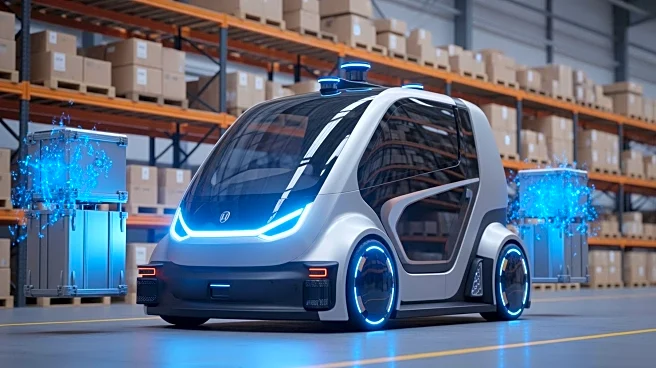What's Happening?
Cyngn, a company specializing in autonomous vehicle technology, has released a case study video showcasing the deployment of its DriveMod Tugger at U.S. Continental. This autonomous vehicle has replaced
approximately 200 weekly forklift trips, significantly enhancing operational efficiency by allowing one vehicle to carry four pallets simultaneously. The DriveMod Tugger operates both indoors and outdoors, providing flexibility in material handling across the facility. According to Dave Hoover, VP of Technical Services at U.S. Continental, the adoption of this technology has led to a fourfold increase in efficiency, enabling the company to redeploy labor to more value-added processes. Cyngn's technology aims to address challenges such as labor shortages and safety incidents in industrial settings.
Why It's Important?
The implementation of Cyngn's DriveMod Tugger at U.S. Continental represents a significant advancement in automation within the logistics and manufacturing sectors. By increasing efficiency and reducing manual labor, companies can lower operational costs and improve productivity. This shift towards automation is crucial in addressing labor shortages and enhancing safety by minimizing human involvement in potentially hazardous tasks. The success of this deployment could encourage other companies to adopt similar technologies, potentially leading to widespread changes in industrial operations and labor dynamics.
What's Next?
As Cyngn continues to develop and deploy its autonomous vehicle technology, other industrial organizations may consider integrating similar solutions to enhance their operations. The positive results from U.S. Continental's experience could lead to increased interest and investment in automation technologies across various sectors. Cyngn's focus on providing cost-effective solutions without requiring significant infrastructure changes may appeal to companies looking to modernize their processes efficiently.
Beyond the Headlines
The broader adoption of autonomous technologies like Cyngn's DriveMod Tugger could have long-term implications for the workforce in industrial sectors. While automation can lead to increased efficiency and safety, it may also result in shifts in employment patterns, requiring workers to adapt to new roles or acquire different skills. This transition could necessitate changes in training programs and workforce development strategies to ensure that employees are equipped to thrive in increasingly automated environments.











